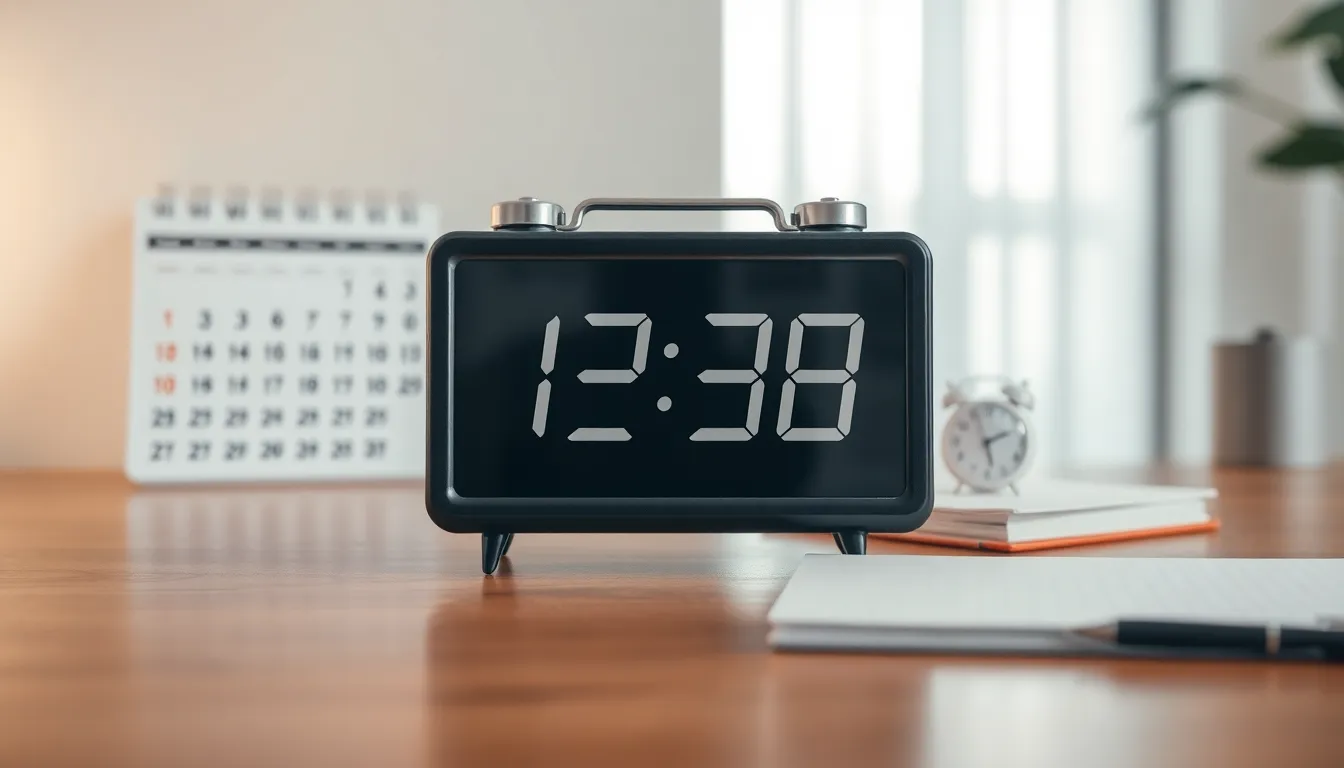Ever wondered just how many seconds tick by in a single day? It’s a question that might sound trivial, but understanding this simple math can add a whole new perspective to our busy lives. Spoiler alert: it’s a lot more than you think!
Table of Contents
ToggleUnderstanding Time Measurement
Time measurement relies on standardized units, which facilitate clear communication about durations. The most common unit is the second, defined by the International System of Units (SI). This unit serves as the building block for larger time measurements, such as minutes and hours.
In a practical sense, 60 seconds make up one minute. Accumulating further, 60 minutes comprise an hour. Within a day, 24 hours align with timekeeping systems worldwide. Calculating the total number of seconds in a day involves multiplying these units.
To determine seconds in a day, multiply 24 hours by 60 minutes, resulting in 1,440 minutes. Next, multiply this figure by 60 seconds, yielding 86,400 seconds in a day. This consistent measure emphasizes how fleeting time can be.
Understanding the significance of seconds in various contexts highlights their importance. For instance, athletes often measure performance in seconds, showcasing the need for precision. In contrast, businesses track time to enhance productivity and efficiency.
Daily tasks also reflect time measurement, influencing how individuals prioritize activities. Time management strategies often consider seconds, driving plans that maximize each moment. Awareness of the total seconds in a day can motivate better use of time and foster a mindset of efficiency.
Concisely, well-defined time units, such as seconds, play a crucial role in daily life and significant events alike. The clarity that comes from this standardization underpins global communication about time.
Seconds in a Day

Understanding the total number of seconds in a day provides insights into time’s significance. A day consists of 86,400 seconds. This figure arises from multiplying 60 seconds by each of the 60 minutes in an hour and then multiplying by the 24 hours in a day.
Calculating Total Seconds
Calculating total seconds involves straightforward multiplication. To derive this, multiply 60 (seconds) by 60 (minutes) to get 3,600 seconds in one hour. Next, multiplying 3,600 seconds by 24 hours leads to 86,400 seconds, representing the entirety of a single day. This simple mathematical breakdown reflects the precise measurement of time that governs daily rhythms.
Comparison with Other Time Units
Comparing seconds to other time units highlights their significance in understanding time. One minute equals 60 seconds, and one hour equals 3,600 seconds. For reference, a day holds 86,400 seconds, making it considerably larger than both minutes and hours. The awareness of these differences aids in time management, offering a clear perspective on how even a few seconds can impact daily efficiency and productivity.
The Importance of Knowing Time in Seconds
Understanding time in seconds is crucial across various fields. Precision matters in science, technology, and everyday activities.
Applications in Science and Technology
Seconds serve as a fundamental unit in scientific research. Experiments often require precise timing to ensure accurate results. Technologies, such as GPS, rely on satellite signals measured in seconds for pinpoint accuracy. Engineers use seconds to evaluate systems and optimize performance. Such precision allows for advancements in various scientific fields, ensuring processes are repeatable and reliable.
Everyday Uses
Individuals rely on seconds to improve time management and enhance productivity. In athletic competitions, performance is measured to the nearest second, impacting placement and records. Cooking requires timing down to the second to achieve perfect results. Daily routines also benefit from a sharp focus on seconds, helping people allocate time efficiently for tasks. Tracking time in seconds fosters a culture of productivity, encouraging prioritization of essential activities.
Understanding that there are 86,400 seconds in a day offers a fresh perspective on how time shapes daily life. This knowledge encourages individuals to reflect on their time management strategies and the importance of each second.
Whether in sports, business, or personal routines, recognizing the value of seconds can lead to enhanced productivity and efficiency. By prioritizing tasks based on time awareness, individuals can make the most of every moment.
As life continues to move at a fast pace, embracing the significance of seconds can empower individuals to take control of their time and ultimately improve their overall quality of life.





